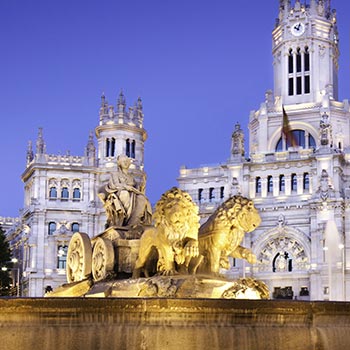Theoretical and Methodological Principles in History
Engineering & Social Sciences Program
Madrid, Spain
Dates: 8/30/25 - 12/20/25

Theoretical and Methodological Principles in History
OVERVIEW
CEA CAPA Partner Institution: Universidad Carlos III de Madrid
Location: Madrid, Spain
Primary Subject Area: History
Instruction in: English
Course Code: 17678
Transcript Source: Partner Institution
Course Details: Level 100
Recommended Semester Credits: 3
Contact Hours: 42
Prerequisites: It is highly recommended that the student has completed either the Humanities Baccalaureate modality or the Social Sciences modality, or, where appropriate, equivalent Baccalaureate modalities or similar in terms of the subjects studied when the student comes from other non-Spanish educational systems .
DESCRIPTION
Section 1: EPISTEMOLOGY
1.1. The nature of science and scientific inquiry
1.2. The particular status of historical science in comparison with natural and social sciences (nomothetic and idiographic sciences)
1.3. The purpose of historical research and the problem of objectivity
1.4. The constitutive elements of the historical ¿matter¿: society, time and change
1.5. The elaboration of the "raw material" of the investigation: historical events and facts
1.6. What kind of knowledge does historiography provide?: explanation and understanding.
1.7. Presentation and purposes of historical knowledge: truth and veracity).
SEction
Section 2: METHODOLOGY AND RESEARCH TECHNIQUES
2.1. The rules of the scientific method
2.2. The historiographical methodology: general features and process
23. Classification and critical treatment of historical sources
2.4. Qualitative and quantitative techniques
2.5. Scheme for making a historical or historiographical text commentary
2.6. Practical recommendations for the elaboration of a history work: research protocols, information treatment and formal presentation of the results
Section 3: GREAT HISTORIOGRAPHICAL PARADIGMS
3.1. The birth of historical science: German historicism
3.2. The rise of positivism: the French Methodical School
3.3. Criticism of historicism: the dispute over the method on horseback in the transition of 19th and 20th century.
3.4. Historical materialism
3.5. The Annales school
3.6. Structuralism vs Neomarxism
3.7. Neopositivism and Postmodernism.
Section 4: SOME CURRENT HISTORIOGRAPHICAL TRENDS
4.1. Global history
4.2. Microhistory
4.3. History of the Present Time
4.4. History of Concepts
4.5. New Political History and New Military History
4.6. Cultural History: from the history of mentalities to history of representations
4.7. Quantitativism and the new currents of economic history
4.8. New currents of Social History: historical sociology, history of everyday life
4.9. Oral History
4.10. Memory and History
1.1. The nature of science and scientific inquiry
1.2. The particular status of historical science in comparison with natural and social sciences (nomothetic and idiographic sciences)
1.3. The purpose of historical research and the problem of objectivity
1.4. The constitutive elements of the historical ¿matter¿: society, time and change
1.5. The elaboration of the "raw material" of the investigation: historical events and facts
1.6. What kind of knowledge does historiography provide?: explanation and understanding.
1.7. Presentation and purposes of historical knowledge: truth and veracity).
SEction
Section 2: METHODOLOGY AND RESEARCH TECHNIQUES
2.1. The rules of the scientific method
2.2. The historiographical methodology: general features and process
23. Classification and critical treatment of historical sources
2.4. Qualitative and quantitative techniques
2.5. Scheme for making a historical or historiographical text commentary
2.6. Practical recommendations for the elaboration of a history work: research protocols, information treatment and formal presentation of the results
Section 3: GREAT HISTORIOGRAPHICAL PARADIGMS
3.1. The birth of historical science: German historicism
3.2. The rise of positivism: the French Methodical School
3.3. Criticism of historicism: the dispute over the method on horseback in the transition of 19th and 20th century.
3.4. Historical materialism
3.5. The Annales school
3.6. Structuralism vs Neomarxism
3.7. Neopositivism and Postmodernism.
Section 4: SOME CURRENT HISTORIOGRAPHICAL TRENDS
4.1. Global history
4.2. Microhistory
4.3. History of the Present Time
4.4. History of Concepts
4.5. New Political History and New Military History
4.6. Cultural History: from the history of mentalities to history of representations
4.7. Quantitativism and the new currents of economic history
4.8. New currents of Social History: historical sociology, history of everyday life
4.9. Oral History
4.10. Memory and History







